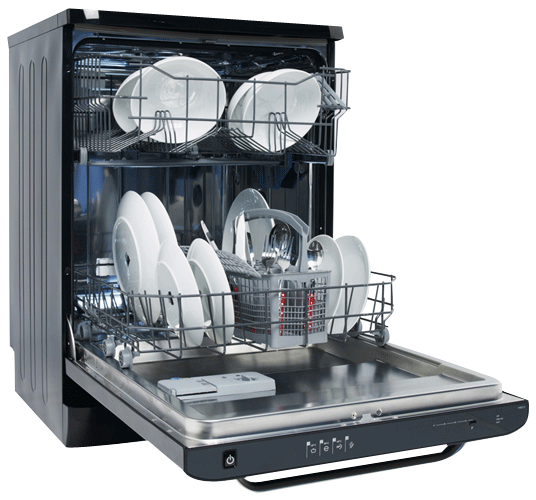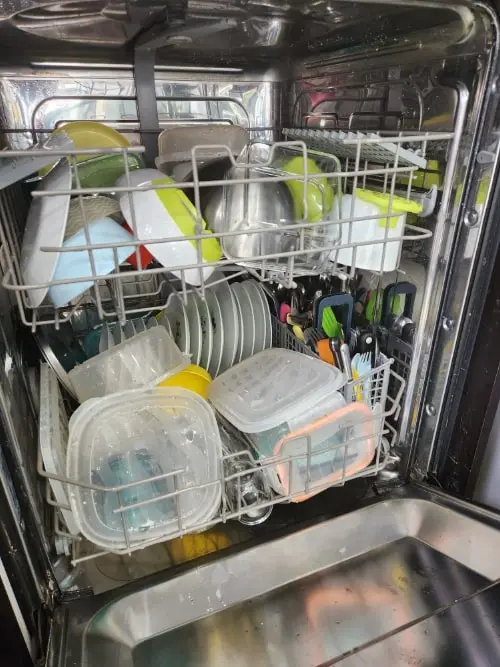Blog
As a skilled dishwasher technician, I’ve seen many cases where bad loading caused poor cleaning and dishwasher problems. In this easy guide, I’ll teach you the right and wrong ways to load your dishwasher. Using my knowledge and real repair experiences, these tips will help you get the best cleaning from your dishwasher and guarantee spotless dishes every time.

Scrape and Pre-Rinse: Remove big food bits from dishes before putting them in the dishwasher to avoid blocking filters. Pre-rinsing gets rid of extra food, making the dishwasher clean better.
Load Right: For good cleaning, load dishes correctly. Put very dirty items on the bottom rack. Light things like glasses and cups go on the top rack. Arrange dishes differently so water and soap spread well.
Use Right Detergent Amount: Use the suggested amount of detergent. Too much creates too many bubbles and cleaning issues, too little leaves dishes dirty.
Choose Right Cycle: Pick the cleaning cycle based on how dirty your dishes are. Use a strong cycle for very dirty dishes, and a shorter one for less dirty dishes.
Keep Dishwasher Clean: Regularly clean your dishwasher inside and out. Check filters and wash arms for blockages or damage.
By doing these things, your dishwasher will work well and clean your dishes properly.

We come to you, view all service location areas
Placement of Pots, Pans, and Large Utensils
Arranging Plates and Bowls for Optimal Cleaning
Positioning of Glasses, Cups, and Lighter Items
Tips for Avoiding Water Spots on Glassware
Arrangement of Silverware for Maximum Exposure
Use of Baskets and Holders

As a dishwasher repair expert, I’ve seen how loading mistakes can damage dishwashers and lead to costly repairs. Here are three examples:
Blocked Spray Arms I fixed a dishwasher that wasn’t cleaning well because of clogged spray arms. The owner overloaded it, making items block the arms and stop water from reaching all dishes. This caused poor cleaning and dirty dishes. After cleaning the arms and teaching proper loading, the dishwasher worked well again.
Broken Glasses At another job, a customer’s glasses were breaking in the dishwasher. They were loaded wrong, touching and hitting each other, which caused damage. I showed them to place glasses apart and angled towards the center. This helped reduce breakages and improved dishwasher performance.
Clogged Drain A tough job involved a dishwasher not draining, leaving water after cycles. Large food bits were blocking the drain system. The owner didn’t scrape off food before loading. I cleared the clogs and explained the need for pre-rinsing. This fixed the drainage problem.
These examples show that loading dishwashers incorrectly can lead to malfunction and extra repair costs.
Dishwashers are really good for several reasons. They keep the water hot and strong, cleaning and getting rid of germs better. Plus, they can save water and power, especially when you fill them up and use them right.
But, for some dishes, like fragile things, old family items, or pots and pans with special instructions, it’s better to wash them with your hands. Always check if you can put something in the dishwasher and follow what the maker says.
Sometimes, dishwashers have problems that need an expert’s touch. Knowing when to call a professional can save you time and money, and keep your dishwasher running smoothly. Plus, it’s safer than trying to fix things yourself. Here are some reasons to call a professional dishwasher technician:
Strange Noises: If your dishwasher is making loud or unusual noises, it might be a sign of a serious problem.
Water Leaks: Leaking water can damage your kitchen and might mean there’s a big issue with your dishwasher.
Not Cleaning Properly: When dishes come out dirty, it could be more than just a simple issue.
Not Draining: Water left in the dishwasher after a cycle is a clear sign something’s wrong.
Error Messages: If your dishwasher displays error codes, a technician can quickly figure out what they mean.
Having trouble with your dishwasher? Don’t wait for the problem to get worse. Contact our specialists at ARNI Services. We have skilled technicians ready to help with any dishwasher issues. Our team offers quick, reliable service, ensuring your dishwasher works perfectly. Trust us to take care of your dishwasher needs.

If you have concerns about your appliance’s performance, contact the professionals at ARNI Services, Appliance Repair, for a thorough diagnosis and repair service. – you can’t put a price tag on peace of mind.